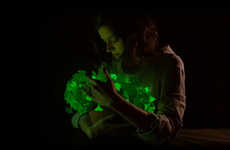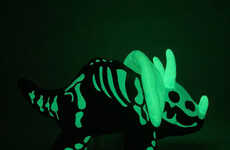
Genetic Clones With Skin that Glows
Going Like Sixty — December 16, 2007 — Unique
References: koreatimes.co.kr & spluch.blogspot
Scientists have genetically cloned kitties to make them glow in the dark. In short, the researchers have developed a methodology for harnessing florescent protein in the skin. And they glow Red under ultraviolet light! Cool Kitty. The experiment has a good cause: to deal with genetic diseases in animals and humans.
The Korean Times notes, "A Gyeongsang National University team said they have succeeded in cloning cats after modifying a gene to change their skin color. Because of the red fluorescence protein in their skin cells, the three Turkish Angola kittens look reddish under ultraviolet light, the researchers said. The red cloned cat research is expected to be utilized in dealing with certain genetic diseases in animals and humans. It will also help reproduce rare animals, such as tigers and wildcats, which are on the verge of extinction, the team said."
The Korean Times notes, "A Gyeongsang National University team said they have succeeded in cloning cats after modifying a gene to change their skin color. Because of the red fluorescence protein in their skin cells, the three Turkish Angola kittens look reddish under ultraviolet light, the researchers said. The red cloned cat research is expected to be utilized in dealing with certain genetic diseases in animals and humans. It will also help reproduce rare animals, such as tigers and wildcats, which are on the verge of extinction, the team said."
Trend Themes
1. Genetic Cloning - Opportunity for genetic cloning technology to be applied in medical research, agriculture, and conservation efforts.
2. Fluorescent Protein - Potential for using fluorescent protein in various industries, such as biomedical imaging, environmental monitoring, and entertainment.
3. Rare Animal Reproduction - Disruptive innovation opportunity to use cloning technology to assist in the reproduction of endangered species and preservation of biodiversity.
Industry Implications
1. Medical Research - Application of genetic cloning and fluorescent protein technology can revolutionize the study of genetic diseases and aid in developing treatments.
2. Biotechnology - Fluorescent protein technology opens up new possibilities in bioimaging, disease detection, and drug development.
3. Conservation - The ability to clone rare animals can have a significant impact on conservation efforts, helping to prevent the extinction of endangered species.
6
Score
Popularity
Activity
Freshness















